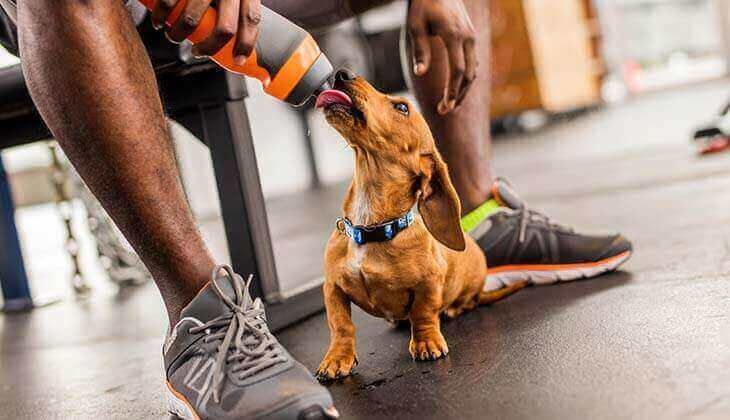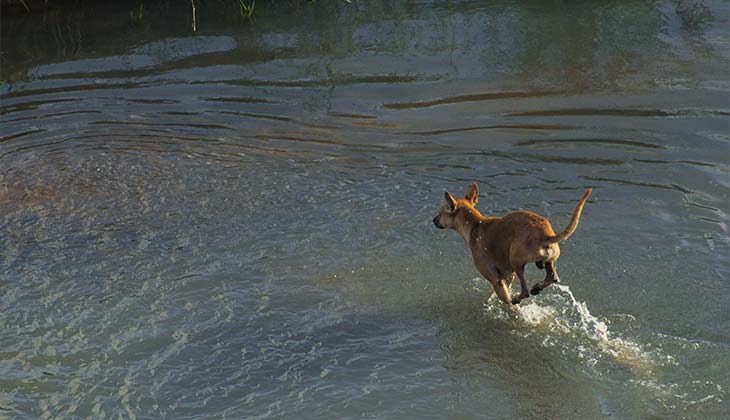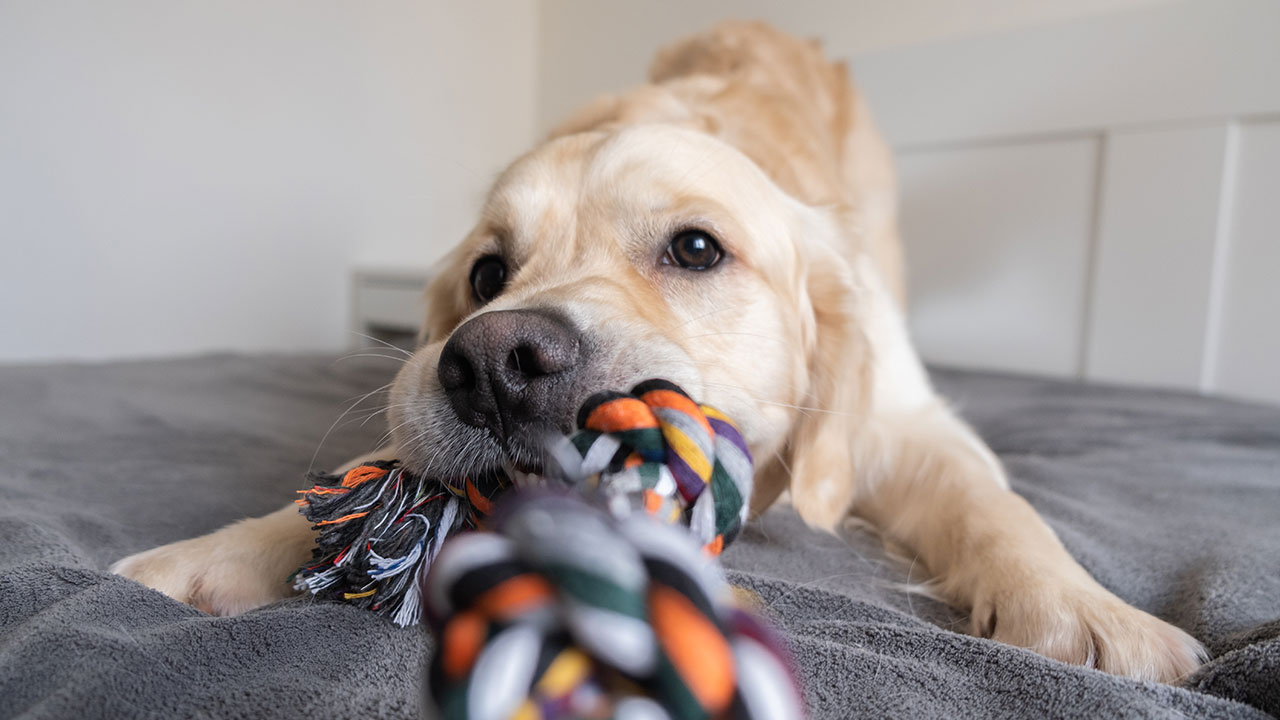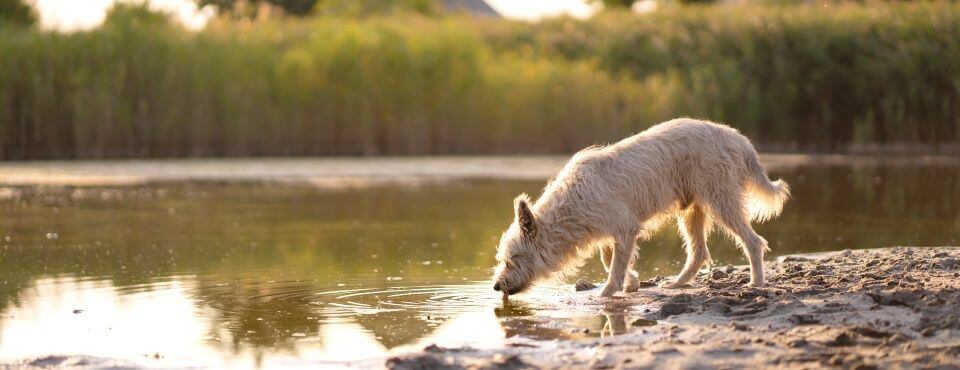Did you know that keeping your dog strong and fit through physical activity can actually lengthen his or her lifespan? Just like humans, your dog receives tremendous benefits from regular exercise. Importantly, obesity is on the rise among dogs and this presents many negative consequences such as diabetes mellitus, an increased risk for some cancers, and a high probability for joint injury and subsequent osteoarthritis (OA).
Exercise also benefits your pooch’s mental well-being by helping him or her work off extra energy and curb boredom, which can result in behavioural issues.
There are plenty of ways you can help your canine friend exercise and stay active – some of which may even surprise you!

HOW MUCH EXERCISE DOES MY DOG NEED?
When it comes to exercise, there is not a one-size-fits-all formula for dogs – the kind of exercise and amount of physical activity varies from dog to dog and is dependent on age, health and breed. A general guide is to gradually increase the duration and intensity of any exercise to build stamina. It is also critical that you provide your dog with enough water and shade to maintain cool. Your veterinary practitioner can help you determine what is appropriate for your pooch; however, there are few things you can consider.
- Puppies. While your young pooch has a lot of energy, any activity should occur in multiple short bursts. You may have noticed that your puppy gets a case of the “zoomies” several times per day, and he or she madly races around the house or yard and then collapses into a breathless heap. Because puppies are constantly growing, strenuous activity could lead to trauma of their bones and joints. This is especially true for large-breed puppies. For this reason, several short walks or play sessions throughout the day is a safer choice for them. This leaves plenty of room for restorative naps in between.
- Breed. Your dog’s breed actually influences the level of physical activity he or she needs. Some breeds are more high-energy and require a lot more exercise, such as the Border Collie and Belgian Malinois. Other breeds are more low energy, like the Bulldog or Basset Hound. Likewise, short-snouted dogs (brachycephalic), such as Chinese Pugs or Shih Tzus, require lower intensity conditioning and have a lower tolerance for heat and outdoor play compared to other dogs.

- Health Conditions. Your dog’s health is also a factor to consider when planning an exercise routine. If your dog has a medical condition such as hip dysplasia or heart or respiratory issues, you should talk with your veterinary practitioner about what kinds of exercise routines will help him or her stay healthy without causing discomfort or breathing difficulty. Also, overweight and obese dogs are more prone to joint injuries and they also have a harder time cooling off. Their activities should be modified to factor these issues into account.
- Senior Dogs. Your older dog might not be able to run as fast or as far as he or she once did, but exercise is still important. Talk with your veterinary practitioner about what activities are right for your senior dog.
TIPS ON EXERCISING YOUR DOG
Going for a brief walk around the neighbourhood is a great way to start an exercise regimen but even less active dogs will appreciate a little variety once in a while. There are many ways to play with your dog and give him or her a good work-out at the same time:
HIKING
Dogs love to be outside and explore. Take your dog with you on an adventure or find some new parks and trails in your area. Remember to adhere to leash and park guidelines, be mindful of other hikers, and check yourself and your dog for ticks.
SWIMMING
Some dogs love to swim and for these pooches, swimming provides great low-impact exercise. A life jacket can help your dog stay safely in the water even longer. However, it’s important to remember that not all dogs are comfortable in the water and you should never presume that your dog likes the water or knows how to swim. Introduce swimming gradually. If your dog doesn’t take to the water, don’t push it and don’t worry. You can find something else he or she will enjoy!

FETCH
Some dogs were born to retrieve and could play fetch all day. Other dogs are not the least bit interested in chasing after a ball and bringing it back to you. If your dog is the kind who likes to play fetch, you can make it even more interesting by alternating between balls, Frisbees or other prized toys. You can toss a ball uphill or into the water (only if your dog likes water and knows how to swim, of course!).
OBEDIENCE TRAINING
This might surprise you, but obedience work actually is exercise for your pooch. Practising recall, retrieving and reinforcing basic commands offers mental stimulation as well as exercise. If your dog loves learning new tricks, agility would be the ultimate combination of exercise and training – a true canine sport!
MAKE YOUR DOG’S EXERCISE REGIMEN PART OF YOUR SCHEDULE
It is very important for your dog to exercise regularly. Carving out some time every day to engage in various activities with your dog will benefit both of you and provide extra bonding opportunities. Steady, progressive conditioning is the best approach for dogs and don’t forget that your veterinary practitioner can play an important role in helping you choose appropriate exercise programs that fit your dog’s individual needs.
Your veterinary practitioner plays a big role in your pet’s health. Enter your location information and get a list of vets near you.
FIND A VETERINARY PRACTITIONER NEAR ME





 Go To United States
Go To United States  Austria
Austria  Belgium
Belgium  Czech Republic
Czech Republic  Denmark
Denmark  Finland
Finland  France
France  Germany
Germany  Greece
Greece  Hungary
Hungary  Ireland
Ireland  Israel
Israel  Italy
Italy  Netherlands
Netherlands  Norway
Norway  Poland
Poland  Portugal
Portugal  Romania
Romania  Spain
Spain  Sweden
Sweden  Turkey
Turkey  United Kingdom
United Kingdom